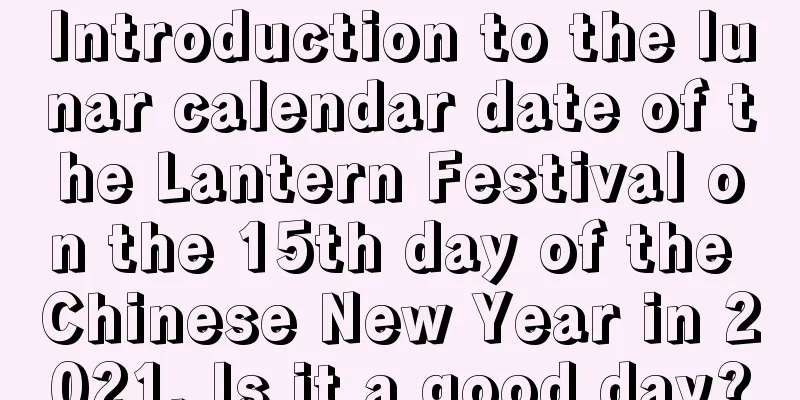Introduction to the lunar calendar date of the Lantern Festival on the 15th day of the Chinese New Year in 2021. Is it a good day?

The days in the lunar calendar will change at different times, so let’s take a look at the lunar calendar date for the Lantern Festival on the 15th day of the lunar year in 2021. Is it a good day? The first month of the lunar year is the beginning of the new year. A new month brings new fortune, and every day is a special day. Let us pay attention to the 2021 New Year special topic of Shuimoxiansheng.com!Introduction to the lunar calendar date of the Lantern Festival on the 15th day of the Chinese New Year in 2021. Is it a good day?The 15th day of the first lunar month of the year 2021 (Lunar calendar)February 26, 2021, Friday, Pisces (Gregorian calendar) 【Today’s lunar calendar is suitable】 [Do not use the day for important matters when the moon is rising] Seeking an heir, taking up a post, accepting money, accepting marriage proposal, migrating, hiding treasure, smoothing the road [Today’s taboos in the almanac] [Do not use the day for important matters when the moon is rising] Decoration, opening, construction, burial, beam raising, opening, groundbreaking, building, praying, offering sacrifices, lifting, opening, building houses, meridians, digging wells. Constellation: Wing (winged fire snake), natal constellation. Conflict: Conflict with pig (Ji Hai), evil east. Fetal god's position: East of the pestle and grinder room. Peng Zu's 100 taboos: Yi does not plant, thousands of trees do not grow, Yi does not travel far, wealth is hidden Do you know the legend about the Lantern Festival?Legend 1: To commemorate the "Suppression of the Lü Clan" . Legend has it that the Lantern Festival was established during the reign of Emperor Wen of the Han Dynasty to commemorate the "Suppression of the Lü Clan". After the death of Emperor Gaozu of Han, Liu Bang, Liu Ying, the son of Empress Lü, ascended the throne as Emperor Hui of Han. After Emperor Hui of Han died of illness, Empress Lü took control of the government and turned the Liu family's empire into the Lü family's empire. The old ministers in the court and the Liu clan were deeply indignant, but they were afraid of Empress Lü's cruelty and dared not speak out.After Empress Lü died of illness, the Lü clan became extremely worried and fearful of being harmed and ostracized. So, they secretly gathered at the home of General Lu Lu and conspired to make a rebellion in order to completely seize the Liu family's kingdom. This matter reached the ears of Liu Xiang, the King of Qi, who, in order to protect the Liu family's kingdom, decided to lead an army to attack the Lü clan. He then contacted Zhou Bo and Chen Ping, two of the founding ministers, and designed a plan to remove Lü Lu. Finally, the "Lü Rebellion" was completely put down. After the rebellion was quelled, the ministers supported Liu Bang's fourth son Liu Heng to ascend the throne and he was called Emperor Wen of Han. Emperor Wen felt that peace and prosperity were hard-won, so he designated the fifteenth day of the first lunar month, the day when the "Lu Rebellion" was quelled, as a day to celebrate with the people. Every household in the capital decorated their homes with lanterns and streamers to celebrate. From then on, the fifteenth day of the first lunar month became a folk festival celebrated throughout the country - "Lantern Festival". During the reign of Emperor Wu of Han, the sacrificial activities for "Taiyi God" were set on the fifteenth day of the first lunar month. (Taiyi: the god who dominates everything in the universe). It is said that when Sima Qian created the "Taichu Calendar", he had already designated the Lantern Festival as a major festival. Legend 2: Torch Festival The Lantern Festival is a traditional Chinese festival since ancient times. It is said that the Lantern Festival began when ancient people held torches in the countryside to drive away insects and animals, hoping to reduce pests and pray for a good harvest. To this day, people in some southwestern China still make torches out of reeds or branches on the fifteenth day of the first lunar month, and dance in groups in fields or threshing grounds with torches held high. It flourished during the Sui, Tang and Song dynasties. There were tens of thousands of people participating in the singing and dancing, which lasted from dusk to dawn and ended at dusk. With the changes of society and times, the customs and habits of the Lantern Festival have undergone great changes, but it is still a traditional Chinese folk festival. |
>>: Is the Civil Affairs Bureau open on New Year's Eve? Is it a good day to get married?
Recommend
How many days in advance should paper money be burned on the 2019 Ghost Festival? Why should paper money be burned at crossroads?
Introduction: The Ghost Festival is a festival for...
Is it suitable to pick up a car on February 12 of the lunar calendar in 2018?
A year's plan begins with spring. The wind in...
How to worship ancestors on the 10th day of April in 2021? What are the rules for worshipping ancestors?
The fourth month of the lunar calendar is a month ...
Is it a bad idea to hold a funeral on April 16th of the lunar calendar in 2018?
It is inevitable that the departure of a loved one...
What about a girl born on July 25th of the lunar calendar in 2020? Is the girl's fate good?
A lot of people are born every day. Different peop...
Is the 22nd day of the ninth lunar month in 2019 a suitable day for renovation? Is it a good day to renovate?
Introduction: You also need to choose an auspiciou...
Is the 21st day of the winter month in 2019 a good day? Check the auspiciousness and inauspiciousness of today's time!
Introduction: Every day has good and bad luck. So ...
What’s in the lunar calendar for August 12, 2020, and what are the do’s and don’ts?
The eighth month of the lunar calendar is also kn...
Can I get a haircut one day after the Great Heat on June 3, 2020? What does the Great Heat mean?
Introduction: Haircuts also need to choose auspici...
Is February 23rd of the lunar calendar 2018 suitable for decoration?
Starting construction of a renovation can enrich p...
Novel phrases for Laba Festival blessings on WeChat, the latest Laba Festival blessings in 2020!
When Laba Festival comes, people start to prepare ...
What are the auspicious days for breaking ground and repairing graves in December of the lunar calendar in 2019?
Introduction: Breaking ground and repairing a grav...
Is it good for a baby born during the Xiaoxue solar term in 2021? What is his fate?
After the light snow, the real winter will come. I...
Is it a good fate for a boy born on October 29th of the lunar calendar? What is the best name to give him?
Introduction: The birth of a child is a happy thin...
Can we visit graves in advance during the Qingming Festival in 2019? How many days in advance can we visit graves?
Introduction: Qingming Festival is an important tr...









